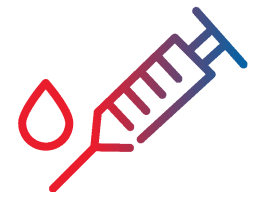Review the ECLIPSE study published in the New England Journal of Medicine. See the data

Early CRC detection through screening with Shield™1
A healthcare benefit every employee deserves
At Guardant Health, we understand that:
- Cancer is the #1 healthcare cost for employers2
- Incidence is on the rise for many types of cancer3
- Employers aim to improve health outcomes and reduce disruptions to business4
FDA approved, Medicare reimbursed
Learn how to offerShield as a benefit
Why are employers offering Shield?
Early screening can help:

Increase
adherence5

Improve health outcomes6

Reduce overall treatment costs7

Reduce
absenteeism7,8
Shield is a more convenient way to screen. This simple blood draw can detect CRC, even in the early stages, and mitigate negative impacts associated with a late-stage cancer diagnosis.1,9
Shield requires no preparation or dietary restrictions, and less time away from work
Why is early screening important?
CRC is the
2nd-deadliest
cancer in the US10
3 out of 4 people who died of CRC were not up to date with screening11
47%
47% of the working-aged population is not up to date with screening12*
Employers who provide early screening offer their workforce a stronger chance of survival and less time away from work and family1,6,9
The 5-year relative survival for people diagnosed with late-stage CRC is only 16%
When CRC is caught early, that number increases to 91%13
*Internal data on file, April 2024
Cancer is the #1 healthcare cost for employers2
Employers are experiencing a rise in cancer-related health outcomes in their workforces.9 However, when CRC is caught early, lives can be saved.3,13
Screening access and education is the best way to encourage your employees to get screened15,16
Offer screening with Shield as a benefitHelp increase CRC screening adherence with an accurate blood-based approach: Shield1,5
95%
of patients say Shield was easy to complete12*
Shield was validated in ECLIPSE, which was published in the New England Journal of Medicine
ECLIPSE included over 20,000 patients from a diverse population, closely mirroring the US Census population (including 12.7% Black or African American, 8.2% Asian, and 76.2% White, with 14.4% identifying as Hispanic or Latino)†. Enrollment of Black Americans was above average for a clinical trial, which is critical given the disproportionate impact of CRC on this community1,6,17
As published in the New England Journal of Medicine, the ECLIPSE study demonstrated the Shield test’s ability to accurately detect CRC1
overall CRC sensitivity
Shield has limited ability to
detect advanced adenomas
specificity
negative
predictive value‡

*Internal data on file, May 2024
†Patients had no prior diagnosis of CRC, inflammatory bowel disease, or family history of genetic risk for CRC (eg, Lynch syndrome)1
‡The probability that a negative test result is truly negative18
Reasons to screen larger and more diverse employee populations with Shield
Incidence and mortality rates for colorectal cancer* by race and ethnicity10
Rates are per 100,000 population and age adjusted to the 2000 US standard population and exclude data from Puerto Rico. Incidence data are adjusted for delays in reporting. All race groups are exclusive of Hispanic origin
Accessible, convenient, patient-centered screening can improve screening rates and help address racial, ethnic, and regional healthcare disparities, narrowing the gap in care.19,20 The combined accuracy and convenience of Shield means that it has the potential to detect CRC sooner, and in more diverse populations who may currently remain unscreened1,5
Patient testimonial*Excludes appendiceal cancer
†To reduce racial misclassification for American Indian and Alaska Native individuals, incidence rates are limited to Preferred/Referred Care Delivery Area counties. Mortality rates are for the entire US and adjusted for misclassification using factors from the National Center for Health Statistics
Guardant Health partners with employers like you to make screening easy and help improve adherence
Shield can be easily integrated into your current benefit and screening programs, worksite health clinics, or through on-site screening events
Learn how Shield fits into your organization
Get in touch
- References:
- Chung DC, Gray DM II, Singh H, et al. A cell-free DNA blood-based test for colorectal cancer screening. N Engl J Med. 2024;390(11):973-983. doi:10.1056/NEJMoa2304714
- Business Group on Health. Cancer now top driver of employer health care costs, says business group’s 2023 health care strategy and plan design survey. August 23, 2022. Accessed May 8, 2024. https://www.businessgrouphealth.org/en/newsroom/news%20and%20press%20releases/press%20releases/2023%20lehcspds
- American Cancer Society. 2024—first year the US expects more than 2M new cases of cancer. January 17, 2024. Accessed May 7, 2024. https://www.cancer.org/research/acs-research-news/facts-and-figures-2024.html
- Deloitte Insights. How employers can spark a movement to help us live longer and healthier lives. June 20, 2023. Accessed May 31, 2024. https://www2.deloitte.com/us/en/insights/industry/health-care/employers-aging-and-health.html
- Coronado GD, Jenkins CL, Shuster E, et al. Blood-based colorectal cancer screening in an integrated health system: a randomised trial of patient adherence. Gut. 2024;73(4):622-628. doi:10.1136/gutjnl-2023-330980
- American Cancer Society. Colorectal Cancer Facts & Figures 2023-2025. Atlanta: American Cancer Society; 2023.
- Cong Z, Tran O, Nelson J, Silver M, Chung K. Productivity loss and indirect costs for patients newly diagnosed with early- versus late-stage cancer in the USA: a large-scale observational research study. Appl Health Econ Health Policy. 2022;20(6):845-856. doi:10.1007/s40258-022-00753-w
- Academy to Innovate HR. Absenteeism in the workplace: a full guide. Accessed May 7, 2024. https://www.aihr.com/blog/absenteeism/
- World at Work. Facilitating earlier cancer screenings benefits employers and employees. August 29, 2023. Accessed May 7, 2024. https://worldatwork.org/resources/education/press_publications/workspan-daily/facilitating-earlier-cancer-screenings-benefits-employers-and-employees
- Siegel RL, Giaquinto AN, Jemal A. Cancer statistics, 2024. CA Cancer J Clin. 2024;74(1):12-49. doi:10.3322/caac.21820
- Doubeni CA, Fedewa SA, Levin TR, et al. Modifiable failures in the colorectal cancer screening process and their association with risk of death. Gastroenterology. 2019;156(1):63-74. doi:10.1053/j.gastro.2018.09.040
- Data on file. Guardant Health, Inc.
- National Cancer Institute. Cancer Stat Facts: Colorectal Cancer. Accessed May 7, 2024. https://seer.cancer.gov/statfacts/html/colorect.html
- Reddy SR, Broder MS, Chang E, Paydar C, Chung KC, Kansal AR. Cost of cancer management by stage at diagnosis among Medicare beneficiaries. Curr Med Res Opin. 2022;38(8):1285-1294. doi:10.1080/03007995.2022.2047536
- Mosen DM, Feldstein AC, Perrin NA, et al. More comprehensive discussion of CRC screening associated with higher screening. Am J Manag Care. 2013;19(4):265-271. doi:10.10197/MLR.0b013e3181dbdce7
- Kew GS, Koh CJ. Strategies to improve persistent adherence in colorectal cancer screening. Gut Liver. 2020;14(5):546-552. doi:10.5009/gnl19306
- US Food and Drug Administration. 2023 Drug Trials Snapshots Summary Report. Accessed June 27, 2024. https://www.fda.gov/media/178602/download?attachment
- National Cancer Institute. Dictionary of Cancer Terms: negative predictive value. Accessed May 21, 2024. https://www.cancer.gov/publications/dictionaries/cancer-terms/def/negative-predictive-value
- Carethers JM. Improving noninvasive colorectal cancer screening (correspondence). N Engl J Med. 2024;390(11):1045-1056. doi:10.1056/NEJMe2400366
- Doubeni CA, Corley DA, Zhao W, Lau Y, Jensen CD, Levin TR. Association between improved colorectal screening and racial disparities. N Engl J Med. 2022;386(8):796-798. doi:10.1056/NEJMc2112409